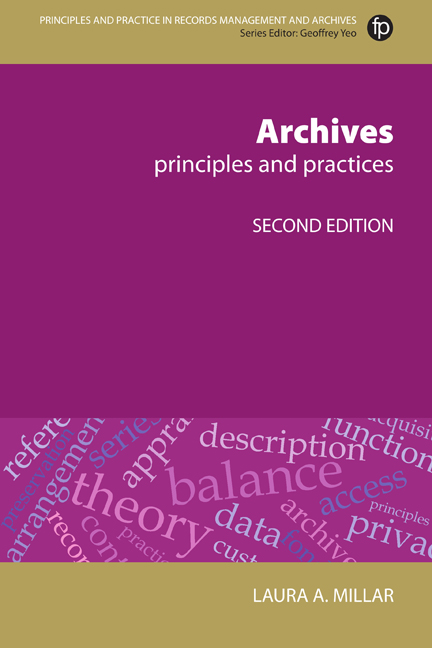Book contents
- Frontmatter
- Contents
- Figures and tables
- Foreword to the first edition
- Foreword to the second edition
- Acknowledgements
- Introduction to the second edition
- PART I ARCHIVAL PRINCIPLES
- PART II ARCHIVAL PRACTICES
- 8 Managing the institution
- 9 Preserving archives
- 10 Acquiring archives
- 11 Arranging and describing archives
- 12 Making archives available
- Conclusion
- To learn more
- Glossary of terms
- Index
- Miscellaneous Endmatter
8 - Managing the institution
from PART II - ARCHIVAL PRACTICES
Published online by Cambridge University Press: 08 June 2018
- Frontmatter
- Contents
- Figures and tables
- Foreword to the first edition
- Foreword to the second edition
- Acknowledgements
- Introduction to the second edition
- PART I ARCHIVAL PRINCIPLES
- PART II ARCHIVAL PRACTICES
- 8 Managing the institution
- 9 Preserving archives
- 10 Acquiring archives
- 11 Arranging and describing archives
- 12 Making archives available
- Conclusion
- To learn more
- Glossary of terms
- Index
- Miscellaneous Endmatter
Summary
Let no act be done at haphazard, nor otherwise than according to the finished rules that govern its kind.
Marcus Aurelius (121–180) Meditations, 161–180 ADEven if she cannot directly shape operations herself, the archivist should understand the organizational environment in which archival service is performed. The policy framework includes the legislation, regulations, policies and strategic plans governing the care of records and archives. The administrative framework includes financial, logistical, physical and personnel conditions surrounding archival service in that institution.
As with everything else related to archival service, legislative, regulatory and administrative frameworks vary significantly from jurisdiction to jurisdiction and institution to institution. Government archives may be bound not only by a core piece of legislation, such as an Archives Act, but also by legislation related to data protection, access or privacy. A museum archives may need to be aware of the requirements of heritage management legislation, while a bank archives has to adhere to regulations for the disclosure of financial data. Even a community or local history society needs to respect copyright and intellectual property rights, which affect all archival institutions and – as examined in Chapter 7 – are governed by different laws around the world.
Imagining the ‘ideal’ organizational structure
Given that every archival institution is different, there is no ‘best’ way to configure operations, but – as emphasized throughout this book – digital technologies are transforming how information and evidence are created, directly influencing the ability of archivists to protect authentic documentary evidence for both immediate and future use. An ideal scenario in the 21st century (one that is, in reality, as rare as a feathered alligator) is one that gives the archivist broad powers to oversee the creation, management, use and disposal of documentary evidence, from before information is created to the point at which archives are secured for preservation.
In such a dream scenario, the archival institution is ultimately responsible for major policy decisions about records management and archival preservation for its sponsor agency. The archival institution is directly accountable for the care, custody or control of archives but also guides the development and implementation of records policies. The institution may also provide guidance and training on effective records and archives care.
- Type
- Chapter
- Information
- ArchivesPrinciples and Practices, pp. 123 - 144Publisher: FacetPrint publication year: 2017



